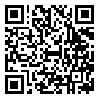Volume 46, Issue 4 (12-2022)
Research in Medicine 2022, 46(4): 72-80 |
Back to browse issues page
Ethics code: IR.MUK.REC.1397.340
Download citation:
BibTeX | RIS | EndNote | Medlars | ProCite | Reference Manager | RefWorks
Send citation to:



BibTeX | RIS | EndNote | Medlars | ProCite | Reference Manager | RefWorks
Send citation to:
Mohammadi A, Ebrahimifar A, Rahimi K, Hasanzadeh K, Eizadpanah E, Ahmadi A. The Effect of Ethanolic Extract of Mentha Pulegium on the Expression of Pro- Inflammatory Mediators in Peripheral Blood Monocytes. Research in Medicine 2022; 46 (4) :72-80
URL: http://pejouhesh.sbmu.ac.ir/article-1-3159-en.html
URL: http://pejouhesh.sbmu.ac.ir/article-1-3159-en.html
Asadollah Mohammadi 

 , Akram Ebrahimifar
, Akram Ebrahimifar 

 , Kaveh Rahimi
, Kaveh Rahimi 

 , Kambiz Hasanzadeh
, Kambiz Hasanzadeh 

 , Esmail Eizadpanah
, Esmail Eizadpanah 

 , Abbas Ahmadi
, Abbas Ahmadi 




 , Akram Ebrahimifar
, Akram Ebrahimifar 

 , Kaveh Rahimi
, Kaveh Rahimi 

 , Kambiz Hasanzadeh
, Kambiz Hasanzadeh 

 , Esmail Eizadpanah
, Esmail Eizadpanah 

 , Abbas Ahmadi
, Abbas Ahmadi 


Cellular and Molecular Research Center, Health Development Research Institute, Kurdistan University of Medical Sciences, Sanandaj, Iran , kaveh_rahimi66a@yahoo.com
Abstract: (1565 Views)
Background and Aim: Inflammation is the immune system’s primary response to harmful stimuli. The aim of this study was to evaluate the effect of ethanolic extract of mentha pulegium on the expression of pro- inflammatory mediators of iNOS and NF-κB in mononuclear cells isolated from human peripheral blood activated with lipopolysaccharide.
Methods: In this experimental study, mononuclear cells of 12 individuals with no history of specific disease were used. In the first group: PBS buffer was added to the culture media. Group 2: Lipopolysaccharide was used to stimulate inflammation at a concentration of 10 ng/ ml (19). Group 3: After stimulation with lipopolysaccharide, a concentration of 10 μg / ml ethanolic extract of mentha pulegium was used in the culture medium. Group 4: After stimulation with lipopolysaccharide, a concentration of 30 μg / ml ethanolic extract of mentha pulegium was used. Group 5: After stimulation with lipopolysaccharide, a concentration of 60 μg / ml ethanolic extract of mentha pulegium was used. Then, the expression of iNOS and NF-KB pro- inflammatory mediators in different groups wasmeasured. Data analysis was performed using SPSS software with one-way ANOVA analysis and Tukey supplementary test.
Results: The results of the present study showedthat the expression of NF-κB gene in the second group (1.09 ± 0.14) significantly increased compared to the first group (P˂0.05). Moreover, NF-κB gene expression was significantly lower in the third group (0.48 ± 0.09), the fourth group (0.54 ± 0.13), and the fifth group (0.66 ± 0.24) compared to the second group (P˂0.05).In addition,, iNOS gene expression in the second group (1.14 ± 0.22) showed a significant increase compared to the first group (P˂0.05). The expression of iNOS gene in the third group (0.35 ± 0.24) and the fourth group (0.29 ± 0.07) was not significantly different from the second group (P˂0.05).
Conclusion: The results of the present study indicated that the Ethanolic extract of mentha pulegium has anti- inflammatory effects and can be effective in altering the expression of pro- inflammatory mediators iNOS and NF-κB in mononuclear cells isolated from human peripheral blood activated with lipopolysaccharide.
Methods: In this experimental study, mononuclear cells of 12 individuals with no history of specific disease were used. In the first group: PBS buffer was added to the culture media. Group 2: Lipopolysaccharide was used to stimulate inflammation at a concentration of 10 ng/ ml (19). Group 3: After stimulation with lipopolysaccharide, a concentration of 10 μg / ml ethanolic extract of mentha pulegium was used in the culture medium. Group 4: After stimulation with lipopolysaccharide, a concentration of 30 μg / ml ethanolic extract of mentha pulegium was used. Group 5: After stimulation with lipopolysaccharide, a concentration of 60 μg / ml ethanolic extract of mentha pulegium was used. Then, the expression of iNOS and NF-KB pro- inflammatory mediators in different groups wasmeasured. Data analysis was performed using SPSS software with one-way ANOVA analysis and Tukey supplementary test.
Results: The results of the present study showedthat the expression of NF-κB gene in the second group (1.09 ± 0.14) significantly increased compared to the first group (P˂0.05). Moreover, NF-κB gene expression was significantly lower in the third group (0.48 ± 0.09), the fourth group (0.54 ± 0.13), and the fifth group (0.66 ± 0.24) compared to the second group (P˂0.05).In addition,, iNOS gene expression in the second group (1.14 ± 0.22) showed a significant increase compared to the first group (P˂0.05). The expression of iNOS gene in the third group (0.35 ± 0.24) and the fourth group (0.29 ± 0.07) was not significantly different from the second group (P˂0.05).
Conclusion: The results of the present study indicated that the Ethanolic extract of mentha pulegium has anti- inflammatory effects and can be effective in altering the expression of pro- inflammatory mediators iNOS and NF-κB in mononuclear cells isolated from human peripheral blood activated with lipopolysaccharide.
Keywords: Ethanolic extract of mentha pulegium, iNOS, NF-kB, Lipopolysaccharide, Peripheral blood mononuclear cells
Type of Study: Original |
Subject:
Physilogy
Received: 2022/02/13 | Accepted: 2022/06/18 | Published: 2023/02/15
Received: 2022/02/13 | Accepted: 2022/06/18 | Published: 2023/02/15
Send email to the article author
| Rights and permissions | |
 |
This work is licensed under a Creative Commons Attribution-NonCommercial 4.0 International License. |




